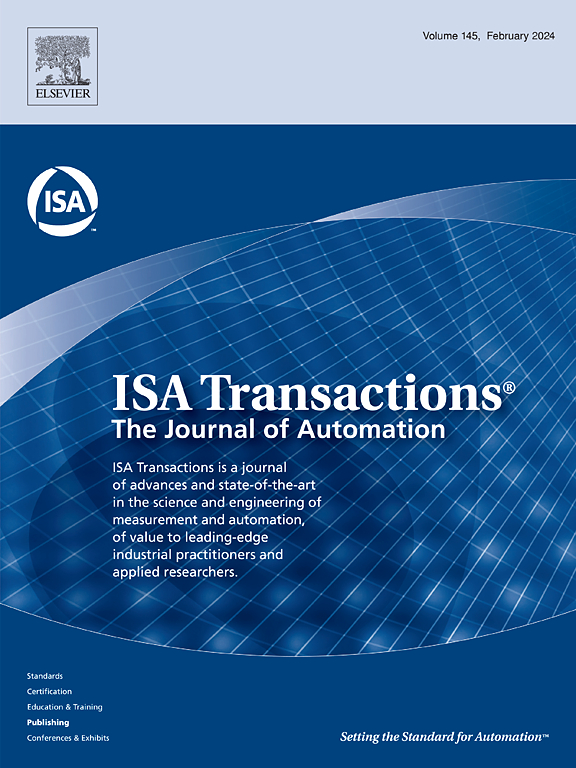MIMO ultra-local model-based adaptive enhanced model-free control using extremum-seeking for coupled mechatronic systems
IF 6.3
2区 计算机科学
Q1 AUTOMATION & CONTROL SYSTEMS
引用次数: 0
Abstract
Multiple degree-of-freedom (DOF) mechatronic systems, such as robots and robotic arms, play a crucial role in modern life and production. However, due to strong coupling, uncertain dynamics, and external disturbance, accurately modeling these systems is challenging, making traditional model-based control methods impractical. To address this, this paper proposes an extremum-seeking-based adaptive enhanced model-free control for multi-input multi-output (MIMO) mechatronic systems to realize robust trajectory tracking. Unlike previous model-free control methods that decouple and reorganize the MIMO system into several single-input single-output ultra-local models, this paper develops a MIMO ultra-local model with a non-diagonal gain matrix to approximate the system dynamics within an ultra-short time window. Time-delay estimation (TDE), Proportional–Derivative (PD) control law and accuracy compensation compose an TDE-based enhanced intelligent PD control that ensures the closed-loop stability. Furthermore, an extremum-seeking (ES) technique is designed to optimize the gain matrix to enhance control performance. The main contributions of this paper are the development of a model-free control framework based on the MIMO ultra-local model and the successful application of ES to optimize the non-diagonal gain matrix . Stability analysis of the closed-loop system is conducted using Lyapunov theorem. Finally, numerical simulations on a 2-DOF robotic manipulator and co-simulation results on a 3-DOF PUMA 560 robotic manipulator validate the effectiveness and superiority of the proposed methods.
耦合机电系统基于MIMO超局部模型的自适应增强无模型极值寻优控制。
多自由度机电系统,如机器人和机械臂,在现代生活和生产中起着至关重要的作用。然而,由于强耦合、不确定动力学和外部干扰,对这些系统进行精确建模是具有挑战性的,这使得传统的基于模型的控制方法不切实际。针对这一问题,本文提出了一种基于极值寻优的多输入多输出(MIMO)机电系统自适应增强无模型控制方法,以实现多输入多输出系统的鲁棒轨迹跟踪。不同于以往的无模型控制方法将MIMO系统解耦重组为多个单输入单输出的超局部模型,本文提出了一种具有非对角增益矩阵α的MIMO超局部模型来逼近超短时间窗内的系统动力学。时延估计(TDE)、比例导数(PD)控制律和精度补偿构成了基于TDE的增强型智能PD控制,保证了闭环的稳定性。在此基础上,设计了一种极值搜索(ES)技术来优化增益矩阵α,以提高控制性能。本文的主要贡献是开发了基于MIMO超局部模型的无模型控制框架,并成功应用ES对非对角增益矩阵α进行了优化。利用李亚普诺夫定理对闭环系统进行了稳定性分析。最后,对一个2自由度机械臂进行数值仿真,并对一个3自由度PUMA 560机械臂进行联合仿真,验证了所提方法的有效性和优越性。
本文章由计算机程序翻译,如有差异,请以英文原文为准。
求助全文
约1分钟内获得全文
求助全文
来源期刊

ISA transactions
工程技术-工程:综合
CiteScore
11.70
自引率
12.30%
发文量
824
审稿时长
4.4 months
期刊介绍:
ISA Transactions serves as a platform for showcasing advancements in measurement and automation, catering to both industrial practitioners and applied researchers. It covers a wide array of topics within measurement, including sensors, signal processing, data analysis, and fault detection, supported by techniques such as artificial intelligence and communication systems. Automation topics encompass control strategies, modelling, system reliability, and maintenance, alongside optimization and human-machine interaction. The journal targets research and development professionals in control systems, process instrumentation, and automation from academia and industry.
 求助内容:
求助内容: 应助结果提醒方式:
应助结果提醒方式:


